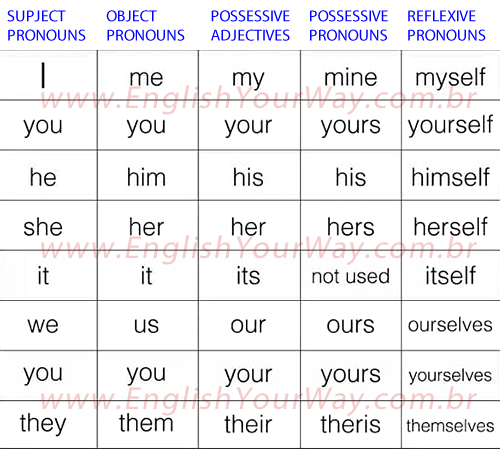1. Subject Pronouns: Subject pronouns are used when the pronoun is the subject of the sentence, meaning it performs the action of the verb. They replace nouns as the doers of the action. Here are the subject pronouns in English:
- I
- You
- He
- She
- It
- We
- They
For example:
- “She runs every morning.” (The subject pronoun “she” replaces the noun that would be the person running.)
2. Possessive Adjectives: Possessive adjectives show ownership or possession. They come before a noun to indicate that the noun belongs to someone or something. Here are the possessive adjectives in English:
- My
- Your
- His
- Her
- Its
- Our
- Their
For example:
- “This is my book.” (The possessive adjective “my” shows that the book belongs to me.)
3. Object Pronouns: Object pronouns are used when the pronoun is the object of the verb or preposition, meaning it receives the action of the verb or follows a preposition. They replace nouns as the receivers of the action. Here are the object pronouns in English:
- Me
- You
- Him
- Her
- It
- Us
- Them
For example:
- “He gave the book to me.” (The object pronoun “me” receives the action of the verb “gave.”)
4. Possessive Pronouns: Possessive pronouns also show ownership or possession, but they stand alone and do not need to be followed by a noun. They indicate that something belongs to someone or something. Here are the possessive pronouns in English:
- Mine
- Yours
- His
- Hers
- Its
- Ours
- Theirs
For example:
- “The red car is hers.” (The possessive pronoun “hers” stands alone and shows that the red car belongs to her.)
5. Reflexive Pronouns: Reflexive pronouns are used when the subject and object of the verb are the same person or thing. They reflect back to the subject of the sentence. Here are the reflexive pronouns in English:
- Myself
- Yourself
- Himself
- Herself
- Itself
- Ourselves
- Yourselves
- Themselves
For example:
- “She hurt herself.” (The reflexive pronoun “herself” reflects back to the subject “she,” indicating that she hurt herself.)
Understanding the differences between these pronouns and adjectives can help clarify their usage in sentences. The table below lists subject pronouns, object pronouns, possessive adjectives, possessive pronouns, and reflexive pronouns.
| Subject Pronoun | Possessive Adjective | Object Pronoun | Possessive Pronoun | Reflexive Pronouns |
|---|---|---|---|---|
I | My | Me | Mine | Myself |
You | Your | You | Yours | Yourself |
He | His | Him | His | Himself |
She | Her | Her | Hers | Herself |
It | Its | It | Its | Itself |
We | Our | Us | Ours | Ourselves |
You | Your | You | Yours | Yourselves |
They | Their | Them | Theirs | Themselves |

For more information visit our PRONOUNS page.
Here’s a multiple-choice exercise to reinforce the understanding of subject pronouns, possessive adjectives, object pronouns, possessive pronouns, and reflexive pronouns:
If you have any questions or doubts, please ask in the comments or send me a private message.
Follow me on Instagram: @englishyourwaybr
or look for the hashtag #LearnEnglishWithCarlo
